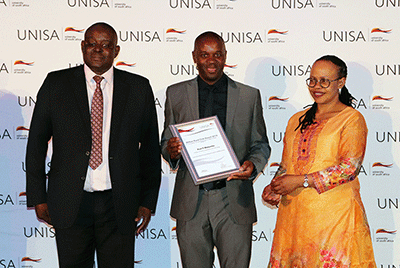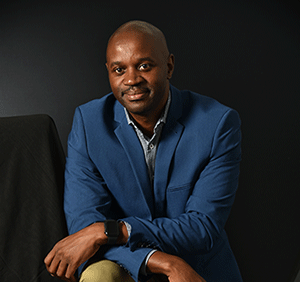
Providing affordable, accessible, high quality, relevant Science Engineering and Technology programmes

Harry Bopape (Director: Research Support) and Prof Thenjiwe Meyiwa (Vice-Principal: Research, Postgraduate Studies, Innovation and Commercialisation) congratulate Prof Tonderayi Matambo (IDEAS, College of Science, Engineering and Technology) (centre) on his membership of the 2019 Unisa Million Rand Club.
Prof Tonderayi Matambo from the Institute for the Development of Energy for African Sustainability (IDEAS) was honoured for his membership of the 2019 Million Rand Club at the 2020 Research & Innovation Awards. The College of Science, Engineering and Technology (CSET) academic received funding from the South African National Energy Development Institute (SANEDI).
In congratulating Matambo and other CSET winners, Prof Sarah Jane Johnston, Head of Research and Graduate Studies in the college, said the following: "It is with excitement and pride that we recognise the achievements of the award-winners and new NRF-rated researchers in CSET for outstanding contributions to research and innovation in science at Unisa. Certainly, research and innovation in CSET is going from strength to strength and is supporting the strategic imperatives for research at Unisa through productivity, transformation, sustainability and influence. I commend each colleague that has been recognised for the hard work and grit required to earn these accomplishments."
In the past, the partnership between Unisa and the Working for Energy component of SANEDI has resulted in the installation of 12 anaerobic digesters at individual households in the rural Eastern Cape (Melani village, Alice). After this successful implementation, the partners undertook, in the second-phase projects, to diversify the implementation of the biogas digester technology to other communities and to cover institutional organisations, including small-scale farmers.
Biogas technology has the potential to uplift poor communities through the production of a cheaper form of renewable energy.
The idea in taking this direction was to gather information that would be useful for future research-based development. In this phase, the digesters will be installed at sites that meet set criteria, such as the energy-poverty status, availability and security of feedstock and water, as well as willingness to operate and maintain the technology.
Biogas technology has the potential to uplift poor communities through the production of a cheaper form of renewable energy and the use of bioslurry as garden fertiliser. This project aims to promote biogas in communities, institutions and on small-scale farms while conducting research, training students and educating the communities about the technology.

Prof Tonderayi Matambo (IDEAS, CSET)
My research is based on investigating, improving and promoting the use of biogas in South Africa. This will be achieved by first understanding the needs of the potential beneficiaries through energy audits. The second stage will be to understand the available substrate’s physicochemical profiles and how this relates to the biomethane potential (BMP) of that substrate.
Once this information is available, the digester designs that suit the substrate characteristics, the client’s needs or the budget are implemented. Once the digester is operational, troubleshooting and optimisation studies focusing mainly on understanding and promoting activity of the microorganisms involved in the production of biogas from organic material will take priority. Different substrates, such as animal manure, kitchen waste and agro-processing residues promote the proliferation of different microorganisms, which will affect the final substrate biodegradation patterns and biogas yields.
Under normal circumstances, using microbiological tools, we will be investigating microbial profiles and activities to inform process control measures that are necessary for each substrate or mode of digester operation. Our research also investigates optimal digester designs for each application or manure. As a result, we are collaborating with the Agricultural Research Council (ARC) to install different types of digesters at ARC’s Irene Campus because of the availability of diversified animal and agro-processing waste streams.
My team is composed of scientists and engineers (holding MSc, PhD and postdoctoral degrees) working together with one goal of disseminating biogas technology in South Africa. We are working on developing prototype digesters, depending on end-user needs.
It is a good initiative that acknowledges researchers who are bringing in funding of R1 million and more. It also helps to encourage other researchers to become members and to take pride in their achievements.
* Interviewed by Thembeka Ntuli-Mpapama, Communication and Marketing Specialist, College of Science, Engineering and Technology
Publish date: 2020/03/19